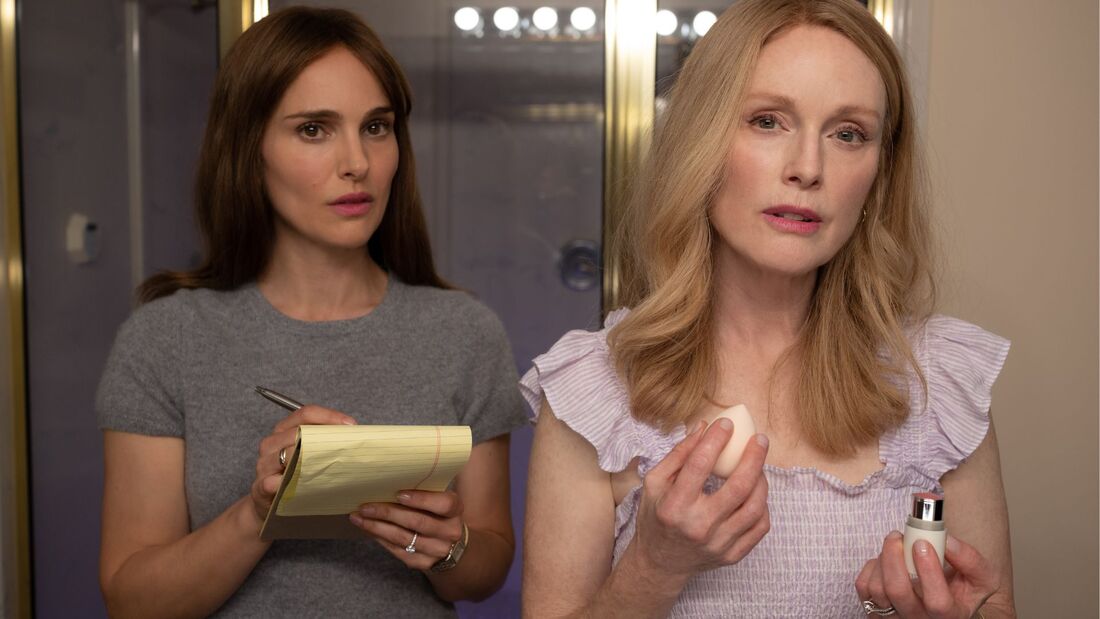|
As far as film-making or writing goes, storytelling knows no bounds. Or should there be strict boundaries? Filmmakers dare to tread upon the forbidden territories of societal norms, stirring the pot of controversy with stories that challenge our perceptions of right and wrong. May December is one such film, a tantalising exploration of love, age, and scandalous tabloid romance. Directed by the enigmatic Todd Haynes, May December takes us on a rollercoaster ride through the complexities of a relationship that defies conventional norms. The film premiered at the Sundance Film Festival, starring the illustrious Natalie Portman as Elizabeth, Julianne Moore as Gracie, and Charles Melton as Joe, and it has left critics divided across the board. Elizabeth, a popular television actor portrayed by Natalie Portman, ventures to Savannah, Georgia, to immerse herself in the world of Gracie (Julianne Moore) and Joe (Charles Melton), the protagonists of the scandalous tale. Their love affair was once splashed across the gossip pages, primarily because of their significant age gap. Gracie, a former convict, and Joe, her much younger lover, overcame societal barriers to build a life together. May December Productions LLCAt first glance, their unorthodox relationship appears deceptively mundane to Elizabeth. However, as she delves deeper into their lives, buried emotions resurface, and the decades-old scandal unveils layers of complexity. The narrative navigates the thin line between performance and exploitation, dishing out surreal melodrama infused with a profound sense of humanity. As the credits rolled, critics from various publications expressed their opinions on May December. In the pages of "Cinephile Chronicles," Sarah Adams hailed it as a cinematic masterpiece, praising the film's audacity in tackling taboo themes head-on. She commended the performances of Portman, Moore, and Melton, noting their ability to evoke empathy for characters embroiled in a love story often dismissed as scandalous.
However, not all critics were as enamoured. Richard Turner of "Controversy Corner" criticised the film for romanticising a relationship many may deem unethical. He questioned the morality of such a narrative, arguing that it might send the wrong message about age-gap relationships. The controversy surrounding May December raises questions about the purpose and meaning of such movies. Does the mere act of exploring highly taboo subjects hold value in itself? Or is it simply a pursuit of sensationalism at the expense of morality and ethics? If the roles in the movie May December were reversed, with a male teacher and a female student involved in a romantic relationship, the reactions to the film would likely be significantly different. This reversal would introduce a whole new layer of controversy and ethical considerations. Drama has always been a haven for filmmakers who wish to push boundaries and challenge societal norms. It's where the unconventional finds its voice and dares to make a statement. May December epitomises this spirit, forcing audiences to confront their preconceived notions about love, relationships, and age. May December is a thought-provoking cinematic journey into taboo themes. It showcases the power of filmmaking to spark debates and challenge our understanding of right and wrong. Whether you find it a masterpiece or a moral quandary, one thing is certain: when it comes to the genre “Drama”, anything is possible, and every story, no matter how controversial, has its place. I would love to know your thoughts about the theme of May December. Are you going to watch May December? Monika Baechler-Dombay
0 Comments
Leave a Reply. |
AuthorMona is a versatile writer with experience in both fiction and non-fiction. She deeply loves the written word and is always seeking new and exciting ways to explore the human experience through her writing. Archives
January 2024
Categories
All
|



 RSS Feed
RSS Feed